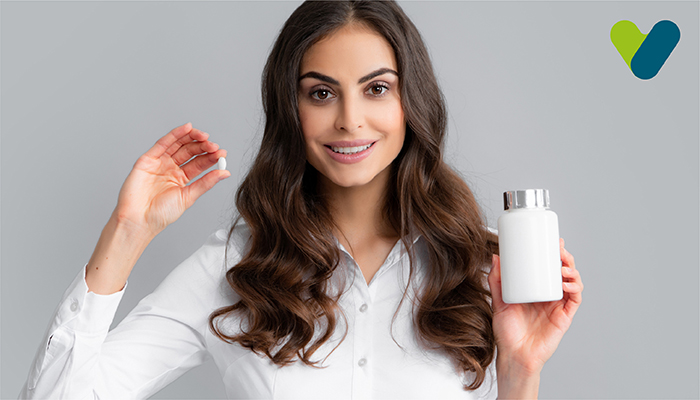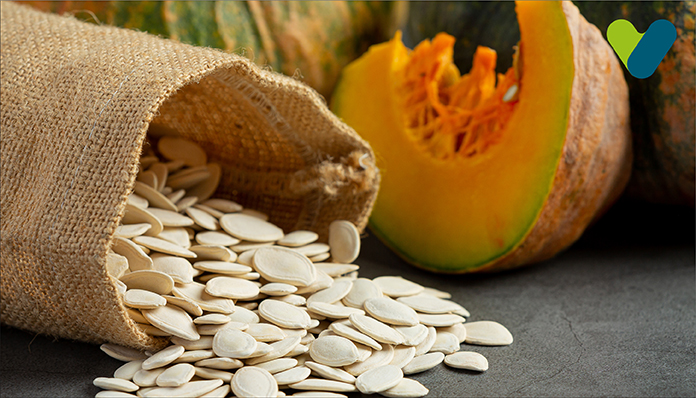When it comes to getting the vitamins and minerals your body needs, the best option is to eat. A healthy eating style that includes a range of vegetables, fruits, whole grains, low-fat or fat-free dairy, and lean protein sources can provide many women with the nutrients they require. In some circumstances, however, a dietary supplement may be required. Some mineral and vitamin requirements rise during pregnancy. Therefore women may need to take a prenatal vitamin. If foods that supply vital nutrients aren't being consumed or inappropriate amounts, or if a health care provider has diagnosed a vitamin or mineral deficit, dietary supplements may be advised.
Essential Supplements for Women
1. Calcium: Calcium is an essential mineral that can be found in large quantities in milk and other dairy products and fortified foods. Calcium accounts for a little more than 1% of a woman's body weight, which helps us understand why we think it's so vital. Almost 80% of the calcium in your body is contained in your bones and teeth. Women are four times more likely than males to develop osteoporosis, so getting enough is critical for long-term bone health. Calcium is essential for heart and muscle action, blood clotting, and regular cell function. Thus the remaining 1% is crucial. Women under the age of 50 should take a daily calcium supplement of at least 500 milligrams and consume calcium-rich foods such as milk, cheeses, and other dairy products, as well as fortified meals. If you're over 50, you should supplement your calcium intake with a daily supplement of 800-1,000 mg in addition to eating calcium-rich foods. If you're taking more than 1,000 mg per day, divide it in half and take half in the morning and a half in the evening to get the most absorption.2. Folate: Folate is a water-soluble B vitamin. Folate is found in the highest amounts in food sources such as leaves (spinach, asparagus) and fruits, hence its name (cantaloupe). Our cells require it to create DNA, and cells would not operate correctly without it. They wouldn't be able to create new partitions or tissue, such as skin and hair. Folate is essential for preventing neural tube defects in the fetus, such as spina bifida, throughout pregnancy, especially in the first few weeks when women are typically unaware they are pregnant. It's also involved in maintaining proper blood levels of homocysteine, a contentious cardiac risk factor. All adult women, especially those planning to have children, should consider taking a folate supplement. Pregnant women should take a folate-rich prenatal vitamin. Non-pregnant women should opt for a multivitamin supplement with 400 micrograms of vitamin D each day. Pregnant women should take a folate supplement of 400-800 micrograms.
3. B Vitamins: These are water-soluble vital elements found in whole grains, fruits, and vegetables, among other foods. Meat, fish, and milk are the only sources of vitamin B12. B vitamins are also added to a lot of meals. A physically active lady can burn up to 2,000 calories per day. And B vitamins are crucial for generating the energy required to meet the demands of daily living, whether you're going to the gym, doing laundry, showering, or presenting a job presentation. Vitamins B6 and B12 help keep homocysteine levels low, which lowers a woman's risk of heart disease. Heart attacks, strokes, and blood clots are all increased by high naturally occurring amino acid levels.
4. Vitamin D: When we are exposed to sunlight, our bodies produce vitamin D, which is a fat-soluble vitamin. Vitamin D-fortified foods, such as milk, also contain it.
It aids in the absorption of calcium from our diet and supplements. Vitamin D is also necessary for the growth and maintenance of strong bones. Researchers are also discovering that adequate vitamin D levels are critical for overall health and preventing disorders such as osteoporosis.
5. Lutein: Lutein belongs to the carotenoids, a group of fat-soluble minerals. Dark-green leafy vegetables (such as spinach) and fruits, corn, and egg yolks contain it. Lutein is an antioxidant that accumulates in the eyes to protect them from free radical damage and the subsequent age-related macular degeneration (ARMD), the leading cause of blindness in older women. Lutein is found in breast and cervical tissue, and it appears to help those tissues stay healthy. It's also found in the skin, and it may help protect you from the sun's harmful rays.
Things to Know About Dietary Supplements
- Supplements aren't always safe: Multivitamins are unlikely to cause any health problems in most cases. Even so, it's critical to use caution when ingesting anything. Supplements may combine with other prescriptions you're taking or offer a risk if you have a medical condition, such as liver disease, or are planning surgery. Some supplements haven't been researched on pregnant women, nursing moms, or children, so you'll want to be cautious. Some supplements may contain substances that aren't specified on the label, which can be harmful. Certain nutritional supplements are presented, but they have prescription medicines that are not permitted in dietary supplements.
- Some supplements are effective, while others are not: There is a reason supplements are so popular: they do work on time. There is evidence that some supplements, in addition to a good diet, can help your general well-being with little to no risk. According to most research, multivitamins will not help you live longer, delay cognitive decline, or reduce your risk of diseases like heart disease, cancer, or diabetes.
- Nothing beats the nutrient power of a healthy diet: Whatever your reason for taking supplements, remember that they aren't a substitute for a nutrition-rich balanced diet. Supplements are supposed to complement, not replace, the benefits that come from eating a well-balanced diet. Supplements should never be used as a substitute for eating actual food. When compared to a pill created in a factory, don't underestimate the power of a nutrient-dense salad. Vitamins and minerals are necessary for your body to develop and function properly. While most people obtain all of the nutrients they need by eating a balanced diet, some require a little extra help.
- Supplements come in many forms: Dietary supplements have a common goal, i.e. to supplement your diet to receive enough nutrients and improve your health. At least one dietary component, such as vitamins, minerals, herbs, botanicals, amino acids, or enzymes, is present. Some of the most common supplements are available as part of a multivitamin (which can save you from taking a dozen tablets every day), but they can also be purchased separately.


